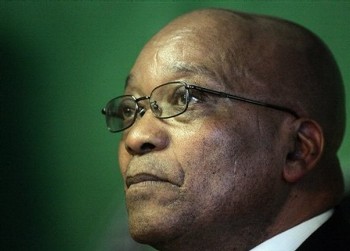South Africa warns Sudan’s Bashir to stay away from World Cup event
May 27, 2010 (WASHINGTON) – South Africa’s president Jacob Zuma today reaffirmed his country’s commitment to execute the arrest warrant against Sudanese president Omer Hassan Al-Bashir should he set foot in the country for the opening of the 2010 FIFA World Cup next month, according to media reports.

“South Africa respects the international law and certainly we are signatories [to ICC Statute] and we abide by the law,” Zuma told lawmakers, when asked in parliament if Bashir would be arrested under the warrant claiming his responsibility for war crimes in Sudan’s Western region of Darfur.
Pressed again whether Bashir would or would not be arrested if he entered South Africa, in view of the fact all African heads of state had been invited to the major soccer event Zuma reiterated his position.
“In my response, that’s the first thing I answered. I answered very clearly that South Africa respects the international law. And that answers the question,”
South Africa is a signatory to the Rome Statute which is the founding treaty of the ICC meaning they are legally obligated to arrest the Sudanese head of state if he arrives in their territory.
The inauguration ceremony of Bashir witnessed the presence of Collins Chabane who is South Africa’s Minister in the Presidency responsible for Monitoring and Evaluation.
“In his congratulatory message to President Al-Bashir, President Zuma commended the Sudanese people for successfully completing this important first step in the democratic transformation of the Sudan. President Zuma further reiterated the government’s commitment to support the Sudanese political role-players as they continue their efforts to put Sudan on the path of peace, stability, democracy and economic development,” said a statement by South Africa’s Department of International Relations and Cooperation.
“The next months will be a critical period in the history of the sister country of the Sudan. The implementation of the Comprehensive Peace Agreement will culminate in the holding of a historic referendum on the unity of the Sudan in which the people of Southern Sudan will decide on whether they remain part of the Sudan or form an independent state. The Republic of South Africa stands ready to support the Sudanese people as they complete this historic task”.
Zuma told South African lawmakers that “these elections, notwithstanding challenges, are viewed as a positive step towards the democratic transition of Sudan as envisaged” in the peace agreement.
South Africa has made it clear several times since Bashir’s indictment in March 2009 that he is vulnerable to apprehension. This was despite the African Union (AU) decision in July of last year to halt cooperation with the ICC in executing the warrant.
However, South Africa issued a formal statement afterwards saying it cannot abide by that resolution.
Today the South African president said that the position of the AU is not to scrap the warrant but to defer it for 12 months with a UN Security Council (UNSC) resolution to give time to fix the crises in the East African nation.
“We reconcile our participation in the process while the leader of that country [Sudan] has the warrant of arrest, on the basis of the African Union decision,” Zuma said.
“The AU took a very deliberate decision and requested the international court to postpone the action against Bashir, given the fact that we’re dealing with a situation of violence, that if it acted immediately, it could reverse the situation in Sudan,” he added.
“That was done collectively by the African leaders and the message was sent. It was correct to do so, because our view was that if you did that, that situation could have got worse. That’s what the AU has said. The AU has not said we must not arrest Bashir”.
“It looked at the situation and felt it was necessary to move cautiously on this matter. That’s what we’ve done. And that’s why we’re reconciling the two points,” he said.
(ST)
